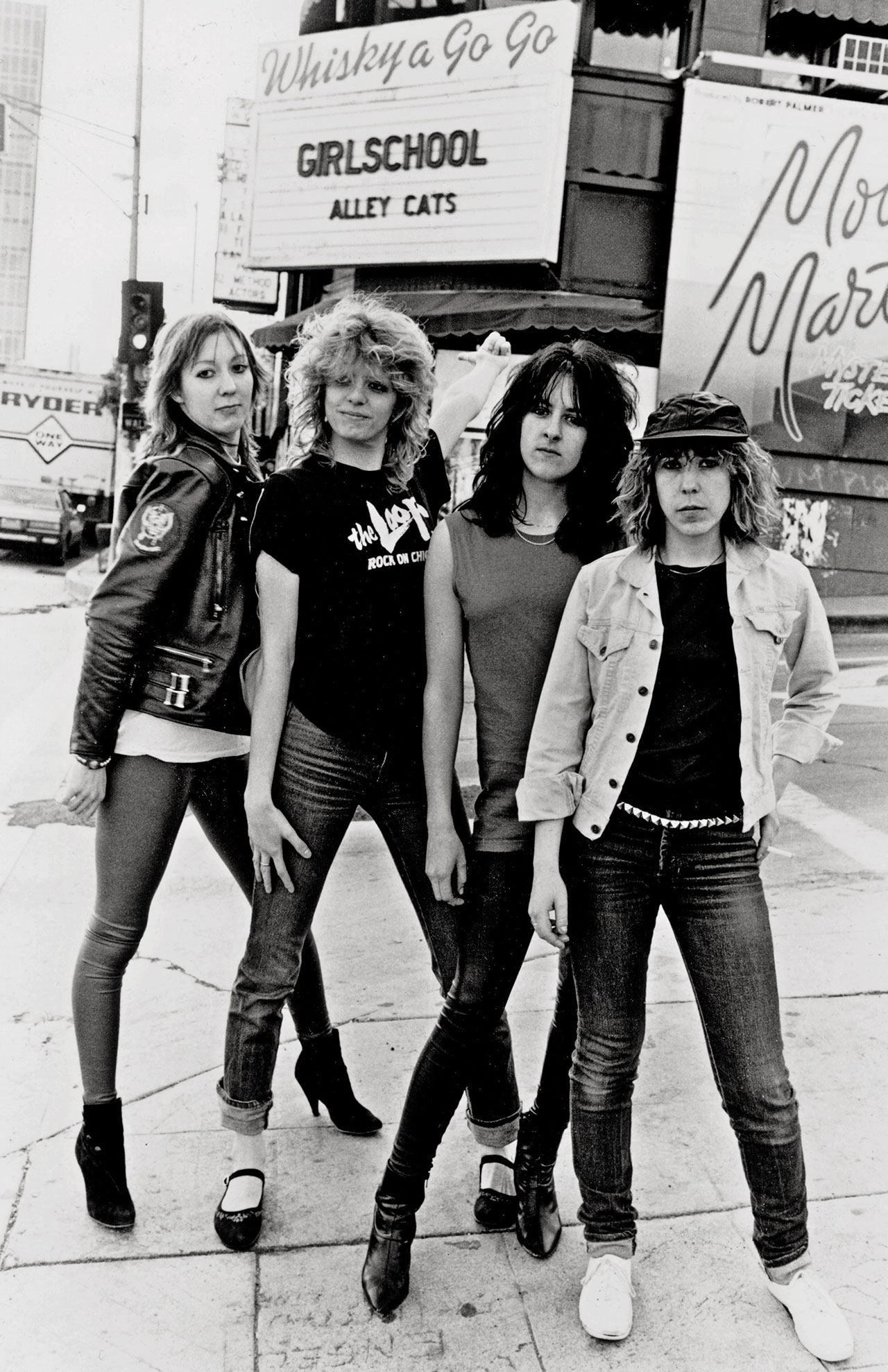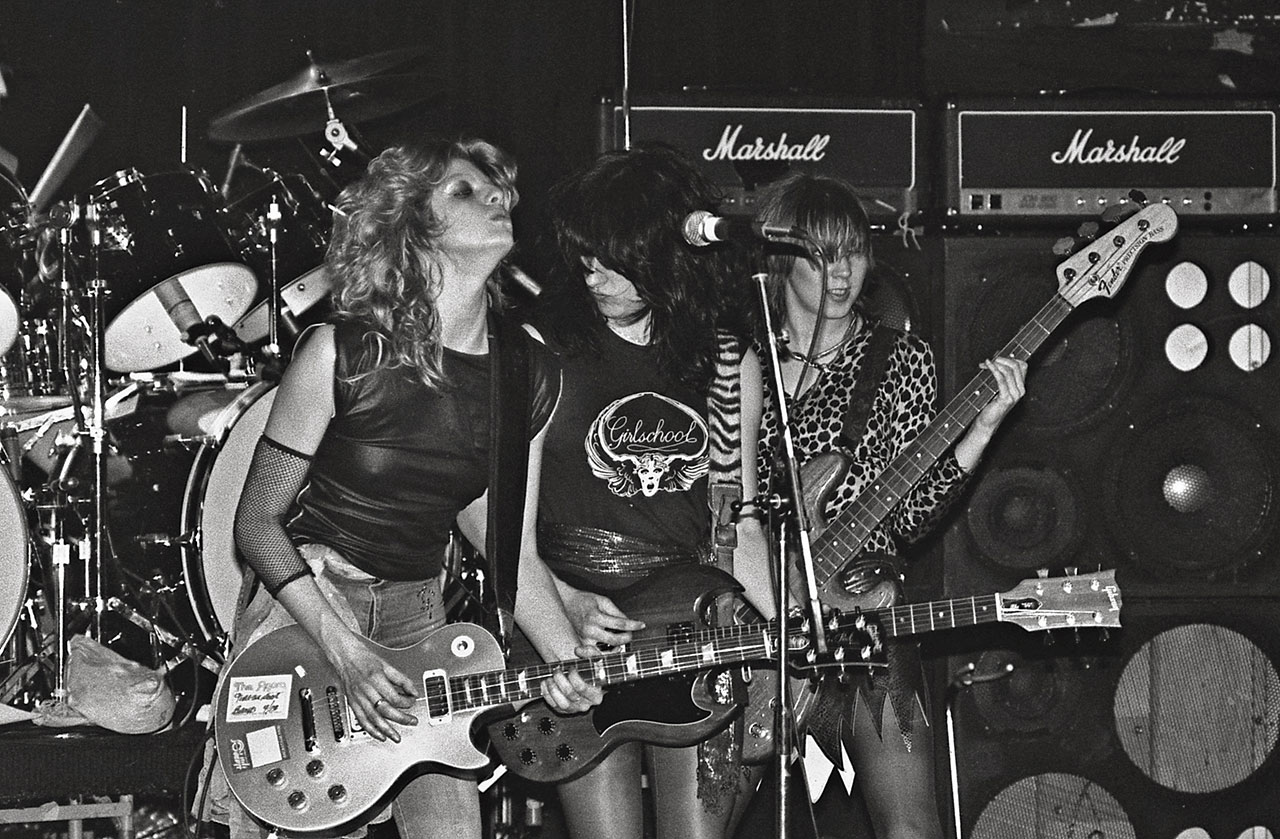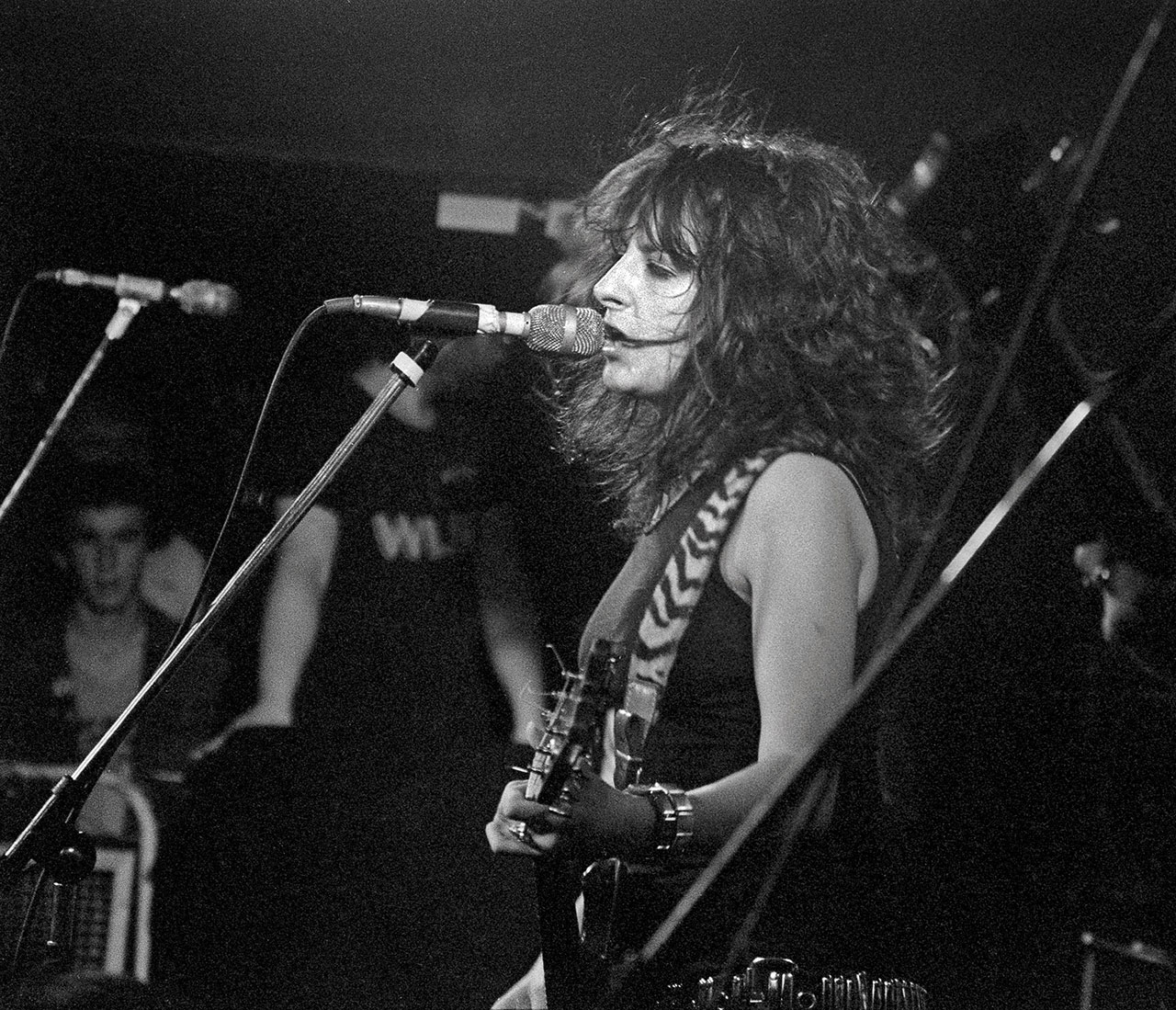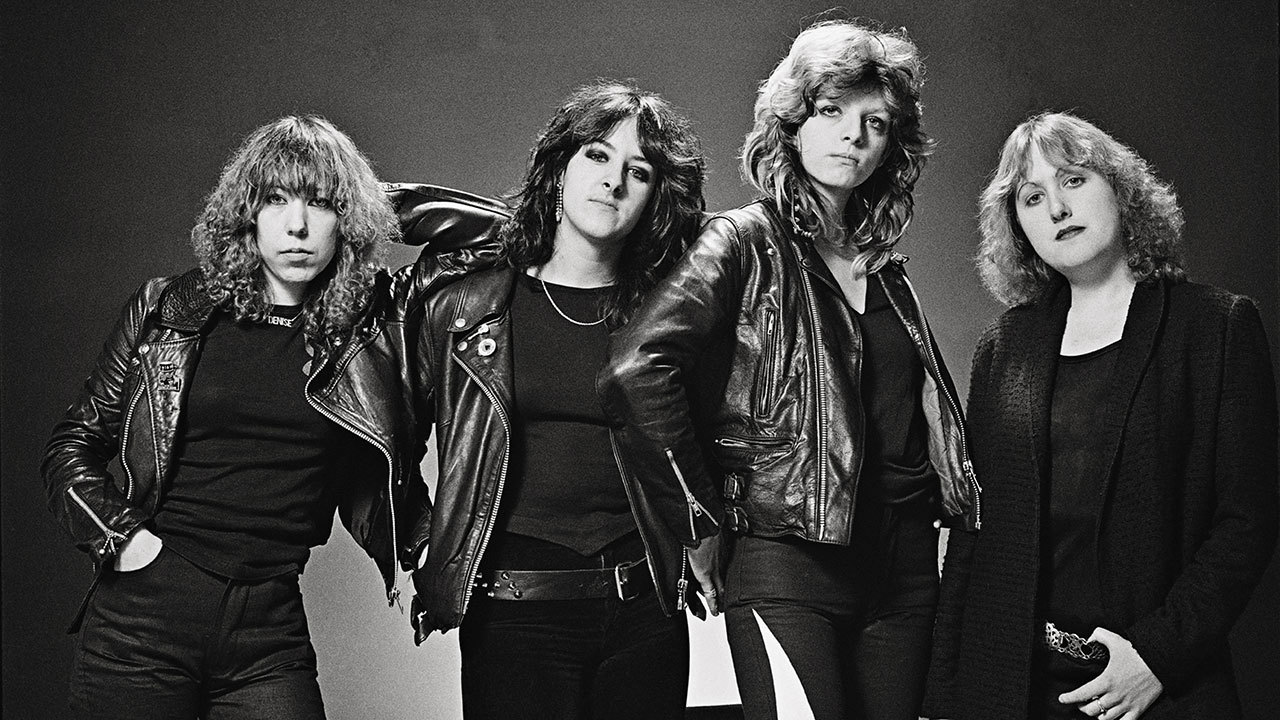There had been other all-girl groups, but none of them meant shit compared to Girlschool, one of the all-time great British rock bands, male or female. Sure, Janis Joplin had broken the mould: not good-looking enough to be dismissed as just another cute doll, Joplin, with her lion’s mane voice and fuck-you Texas attitude, was seen as ‘one of the boys’ – not quite the huge compliment it was intended to be in the Cro-Magnon late-60s music scene.
Then there was Jefferson Airplane singer Grace Slick, the first person to use the word ‘motherfucker’ on US television, in 1969, and the year before that, the first woman to raise a Black Power fist at the end of another TV performance. But Grace was a former model, and even the beard-strokers of the North Beach poetry-beat-hippie crowd had a hard-on for her. She’d been married to the drummer of her previous band and was now shacked up with the guitarist in the Airplane, Paul Kantner. Grace was cool but she was still someone’s ‘old lady’.
Girlschool, whom I first met in 1980, weren’t like that. They came across as a genuine gang – they were nobody’s girlfriends. They were never ‘one of the boys’, although if you hung out with them, you might, if you were cool enough, become one of the girls.
“We had a lot of great men friends, like the guys in the UK Subs,” singer/guitarist and co-founder Kim McAuliffe says now. “But we weren’t trying to be them, we weren’t trying to fit in with the guys. Other than we were all musicians. It was about trying to be ourselves.”
That wasn’t as easy as it sounds in that pre-Aids, pre-‘alternative’ era of the late 70s, when the band first formed. There was the all-female American group Fanny, who were for real, but despite critical support, they never made the charts. Only punk, which gave birth to several very cool female artists, including one of the most groundbreaking female groups of all time in The Slits, came close to breaking the stereotypical mould.
So when Girlschool came along in 1980, hopes for their success were not high, despite giving as good as they got on Motörhead’s Overkill tour of 1979. That is until you got a load of their fabulously fun and riotously rocking debut album, Demolition – like Thin Lizzy meets Motörhead meets the craziest girl in school that all the boys are a bit scared of. On hot-groove tracks such as Emergency and Demolition Boys, they didn’t so much sound like they might scratch your eyes out as boot you in the balls and nick your beer.
“We wore jeans and leathers – real ones, not made-up costumes. Our actual street gear. It was all about the music. If you couldn’t relate to us on that level, you could fuck off, basically,” McAuliffe laughs.

Well, yes. But that didn’t mean Girlschool lacked sex appeal. They had it most obviously in their striking other singer/guitarist, Kelly Johnson. A year older than McAuliffe, and a whole lot blonder, taller and prettier, Johnson had just turned 22 when Demolition came out in 1980.
“Overnight, Kelly became the one all the press wanted to meet and write about,” recalls Status Quo manager Simon Porter, who back then worked as Girlschool’s PR. “Not just the music press – the band was in Kerrang! and Sounds practically every week – but the national press. Of course, it was all that ‘girls in bands, shock horror’ stuff, as if aliens had landed from another planet. But mainly it was about Kelly, because she was blonde and good-looking and everybody fancied her.”
Porter is quick to point out, however, that while Johnson and McAuliffe and the band’s other two members – singer/bassist Enid Williams and drummer Denise Dufort – were under no illusions over what the tabloids were really after, they never saw it as their unique selling point.
“Kelly and Kim looked great together in pictures – you know, the dark lady and the blonde bombshell, and they were happy to play off that,” says Porter. “Ultimately, though, it really was all about how good they were as musicians. I also did the PR for Motörhead at the time and for me, Girlschool actually had more potential for long-term commercial success. If they were around now they would have become enormous. As it was, they were ahead of their time.”
McAuliffe agrees. “Kelly was obviously very photogenic, and so she got a lot of attention. But we were all alright with that, because it never went to her head. In person Kelly was really quite shy, very kind and gently spoken. A very warm person, easy to get on with.”
But while the band quickly became adept at dealing with unwanted ‘attention’ from music biz insiders, McAuliffe insists they never experienced the groupie phenomenon common to even the ugliest male bands.
“All the fans were in love with Kelly, but she had a boyfriend when we first started getting well known,” she says. “And she wasn’t into one-night stands anyway. None of us were. If anything, we despised that whole side of the touring life. All of the male bands we toured with, either as headliners or supports, they all indulged in the groupie scene. And you would see some terrible things. Girls being handcuffed to radiators while the guys used and abused her, then left her chained up when they split the gig. It was shocking.
“So if anything, we were dead against that side of things. I remember one time on tour in America, after a show, these two guys climbing up a drainpipe of this hotel we were staying in, trying to get to my room. I just opened the window and yelled at them: ‘What do you think you’re doing? Go away!’”
Even when real top-five fame arrived with the release of their second album, Hit And Run, in 1981, the band made few concessions in terms of selling themselves. Yes, Johnson could now be found posing in silver trousers, while McAuliffe was happy to wear a red miniskirt. But this was now the era of NWOBHM flame-outs like Def Leppard and Saxon – colours were in, albeit bound in leather and denim.
“We would get asked if we saw ourselves as feminist,” McAuliffe says, “and I suppose Kelly and I did see ourselves that way. But we never felt the urge to make a big deal of it. Our kind of feminism was more about getting up off your arse and going out and doing whatever it is you really wanted to do, not trying to change the rules. Just go for it, whatever anyone thinks or says.”
That was certainly Johnson’s way. She was perfectly okay with Girlschool sharing a Top Of The Pops stage with Motörhead for Please Don’t Touch, the lead track from St Valentine’s Day Massacre, the bands’ joint hit single – billed as Headgirl – that year, where she co-fronted and shared lead vocals alongside Lemmy. She was equally relaxed about what today would be addressed as her openly bisexual nature.
“Kelly never ‘came out’, as such,” says McAuliffe. “When she first joined the band, I was living at home with my parents, and Kelly came and moved in with us. We used to share my bedroom, and it was all the usual teenage girl things, staying up all night with huge stashes of chocolate and records and not getting up till four in the afternoon.
“Of course we talked about boys and all that. Kelly had a boyfriend. But Kelly was an incredibly open and loving person. If she let someone special into her life, she loved them wholly. It didn’t matter what they were.”
Working in the biz during those years, in regular contact with Girlschool’s management and PR people, always running into the girls at gigs and parties, I can vouch for the fact that McAuliffe’s ‘true’ sexuality was a question much discussed – and in truth, in some cases, sniggered over – around the campfire. Although it was always acknowledged that the band itself never made an issue of it.
“We didn’t see ourselves as feminist icons,” McAuliffe says, “and Kelly was certainly not interested in becoming any sort of gay icon. It wasn’t about that. It really was about whether you liked the music or not. And whether we could keep coming up with great records and shows.”

Ironically, if it had simply been down to image, then Girlschool’s career might have seen them have even more hit records. But it was the music that let them down in the end. Their third album, Screaming Blue Murder, in 1982, was pitched firmly at the same NWOBHM audience that was now lapping up Iron Maiden, and featured a typical-for-the-times cheesy heavy metal cover shot of the girls vamping self‑consciously in a giant cage.
Predictably, the record did not replicate the commercial success of Hit And Run, nor the critical plaudits of Demolition. But it was their next album, in 1983, that finished them off for good.
Speaking to me years later, McAuliffe admitted that Play Dirty had been “an attempt to make our own Pyromania”.
Def Leppard’s 1983 album had sold seven million copies in America and, musically, represented a huge leap forward from their early mishmash of Lizzy-Stones-AC/DC riffs and bad-boy lyrics. In its wake, ZZ Top had successfully tried something similar with Eliminator, also released in 1983, which became their biggest seller of all time.
Now, in Girlschool’s attempt to reverse their commercial fortunes in Britain, and finally break through on to the dollar-mungous US scene, they had brought in the drum machines, synthesisers and harmonic vocal ‘explosions’ and gone for broke with the most ambitious and daring album of their career – only to see it completely fail to do its job at setting the charts alight, and become their worst‑selling album yet.
“We were so proud of that record,” McAuliffe says now. “We even got close to the Billboard Hot 100 with it, and were all set for a major American tour, but then the record company took over and things just… fell part.”
It was a career hurdle they might have eventually overcome, however, if Johnson hadn’t suddenly changed her mind about the whole damn thing and quit.
“We were in America and things were going horribly wrong,” McAuliffe says, “so we left LA to come back to London. Only Kelly decided she wanted to stay in LA.”
In fact, Johnson stayed in LA for the next 10 years, where she settled into a long-term relationship with LA-born Victory Tischler-Blue – aka Vicki Blue, former bassist of The Runaways, themselves a proto-punk all-girl band, sold by their producer-creator Kim Fowley as, he once told me, “jailbait, pure and simple”.
Where Lita Ford and Joan Jett forged successful solo careers for themselves after the dissolution of The Runaways, Vicki Blue moved into acting – that’s her as Cindy in This Is Spinal Tap – and producing film and TV projects. She also sang backing vocals on Girlschool’s Play Dirty, where Johnson fell under her spell.
McAuliffe refuses to even speak her name when we speak now, such is the bitterness she still feels over the events that led to Johnson leaving Girlschool.
“It broke all our hearts when Kelly said she didn’t want to come back with us to England,” she says. “But it seems she was getting advice from people that… well…”
She doesn’t want to dish the dirt. But when I ask if we are talking about a ‘Yoko’ scenario here – i.e. McAuliffe listening to whispers from her new girlfriend – and now, hey presto, manager – along the lines of, ‘You don’t need them any more, you can be a bigger star without them,’ she sighs and replies: “Yes. Absolutely.”
But while Johnson’s heart now belonged to Vicki Blue, it seems her desire to be famous in her own right was simply not that strong. “I heard she was gonna front her own band called Kelly’s Heroes,” McAuliffe says. “I remember thinking: ‘What a great name! She’s probably going to be huge.’”
But nothing came of it and Johnson soon ‘retired’ into a new life. She had never seen herself as a feminist, though she was. She had never felt the need to come out publicly on behalf of the sisterhood, although she provided the inspiration to many young female rock fans. Instead she followed her real passions, which were as an environmentalist, an animal rights activist and a staunch vegetarian. But then Johnson had never tried to be anyone – except herself.
Interviewed in Smash Hits magazine at that time when Girlschool became the first all-female act on Top Of The Pops since Op-Art miniskirts were in fashion, Johnson cheerfully confided how she much preferred pop music when she was growing up.
“A few girls in my class at school were into Black Sabbath, but I’d listen to it and think, ‘How boring, it’s all the same, there’s no tune, no melody.’ I’d rather listen to The Beatles or T.Rex.”
Somewhat baffled, the Smash Hits reporter asked: “If you weren’t in Girlschool would you listen to Girlschool?”
Johnson just giggled and shook her head. “Oh no,” she said. “I like a few tracks… I really like two tracks.”
When I remind McAuliffe, she laughs and says: “Well seeing how she co-wrote most of our best songs in those days, I’m sure she liked more than just two. But that was Kelly. She never took herself too seriously. And woe betide anyone around her that did.”

Girlschool carried on without Johnson, becoming welcome staples on the rock festival circuit. But school was out in terms of major record sales. Other girls came in to replace Johnson – and bassist/singer Enid Williams, and eventually the replacements of the replacements. McAuliffe and drummer Denise Dufort are still with the band today.
There was one last hoorah for the Kim-and-Kelly line-up, when Johnson returned to the band in the mid-90s.
“We went to meet her at the airport and she looked fabulous. Those ten years in LA had left her tanned, golden hair, just really healthy looking.”
But just as the band looked to be on the verge of carving out a new career on the suddenly lucrative classic rock circuit, the greatest tragedy of all struck when Johnson was diagnosed with spinal cancer. After a six-year struggle, she died on July 15, 2007.
“She kept it all hidden from the fans,” says McAuliffe. “But it was awful for her. One minute she’d be up, told the cancer was in remission, the next down again after being told the cancer was back.
“I’m just so glad we had those final years back together. It wasn’t because she was blonde and pretty that made Kelly so special. It wasn’t even how good, how cool she looked and played on stage. She was just a beautiful soul. You don’t have to be a woman to have a beautiful soul, you just have to be a wonderful human.”
Classic Rock, Metal Hammer, Prog & TeamRock launch She Rocks month

